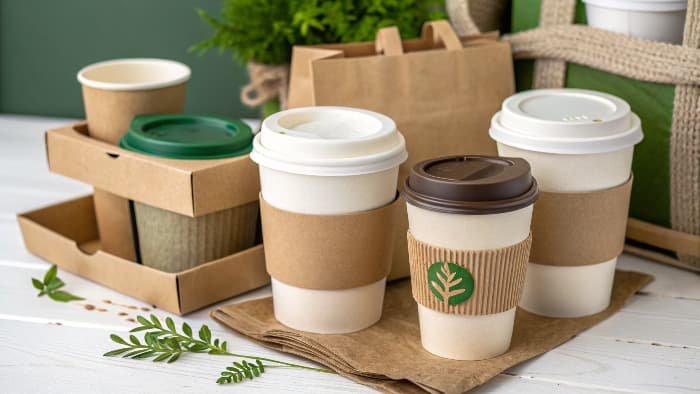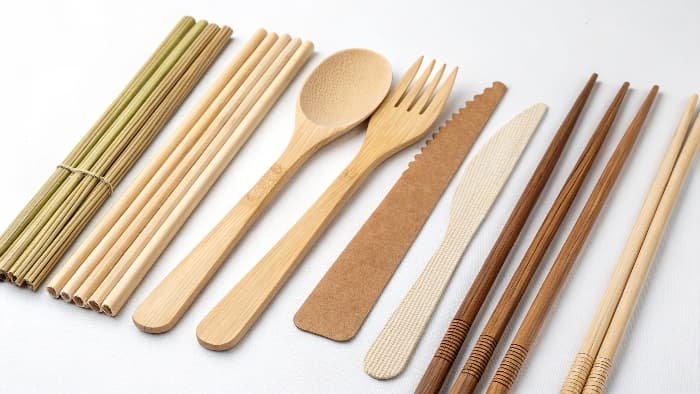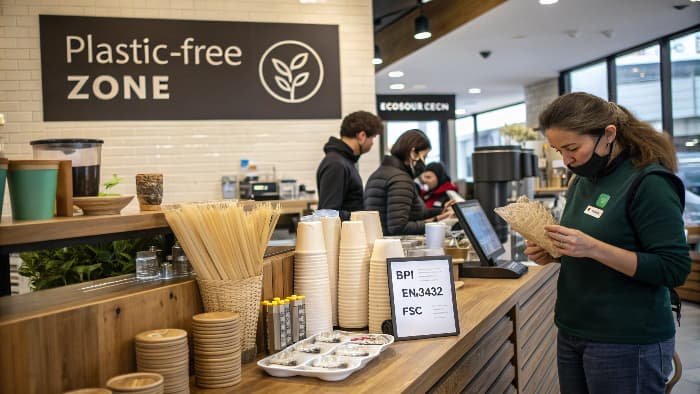Drowning in plastic waste from your coffee shop? It’s a nightmare for your eco-goals and customers are noticing. You want change, but where to even start?
Yes, a fully plastic-free coffee shop is achievable with today’s innovative eco-friendly cups, lids, stirrers, and packaging, sourced from reliable suppliers who prioritize sustainability.
I’ve seen so many coffee shop owners, just like you, wrestling with this. You’re passionate about great coffee, amazing service, and increasingly, about doing right by the planet. But the sheer amount of single-use plastic in a typical cafe operation can feel overwhelming. It’s like, where do you even begin to tackle it all? I’m here to tell you it’s not just a dream; it’s totally doable. We at Ecosourcecn help businesses make this switch every single day, and honestly, seeing the relief and pride on their faces is one of the best parts of my job. Let’s break it down, bit by bit, so you can serve up sustainability with every latte.
Why Go Plastic-Free? The Big Picture for Your Cafe?
Feeling the pressure to be more eco-friendly but not sure it’s worth the hassle? Plastic is cheap, but its environmental cost is massive, and customers are watching.
Going plastic-free boosts your brand image, attracts eco-conscious customers, reduces landfill waste, and often complies with upcoming single-use plastic bans. It’s a win-win!
Let’s be real, the "why" is pretty huge these days. It’s not just some fringe movement anymore. I remember talking to Jacky, our eco-product buyer client in Canada, and he put it perfectly: "It’s no longer a ‘nice-to-have,’ it’s a ‘must-do’ for brands that want to stay relevant and responsible." And he’s spot on. The tide has seriously turned against single-use plastics.
Here’s what I see happening:
- Customer Demand is Soaring: More and more people are actively seeking out businesses that share their environmental values. I’ve seen cafes gain a loyal following just by making the switch. It’s a powerful marketing tool! Think about it – your customers want to feel good about where they spend their money.
- Brand Reputation Gets a Polish: Shifting away from plastic shows you’re a forward-thinking, responsible business. This isn’t just about avoiding bad PR from images of overflowing bins; it’s about building a positive, proactive image. It says you care.
- Regulations are Tightening: All over the world, governments are bringing in bans and restrictions on single-use plastics. We’re talking plastic bags, straws, cutlery, and yes, even certain types of cups and containers. Getting ahead of these regulations means you won’t be scrambling to comply later. It’s just smart business planning.
- The Planet (Obviously!): This is the big one, right? Less plastic means less pollution in our oceans, less harm to wildlife, and a lighter load on our already strained landfill sites. Every single plastic cup or stirrer avoided makes a tiny, but collective, difference. It feels good to be part of that solution. At Ecosourcecn, our whole mission is built on this – reducing global plastic waste. It’s what gets us up in the morning!
What are the Best Plastic-Free Coffee Cup Options Available Today?
Tired of those plastic-lined paper cups that aren’t really recyclable? Finding a truly eco-friendly cup that performs well can be a major headache for cafe owners.
Top plastic-free cup options include compostable PLA-lined paper cups, bagasse (sugarcane) cups, and even innovative barrier-coated paper cups that are fully recyclable or compostable.
Ah, the coffee cup – the hero and villain of the takeaway world! This is often the first thing cafes want to tackle. And for good reason! Those standard "paper" cups? Most of them have a thin plastic (polyethylene) lining to make them waterproof. This lining makes them a real pain to recycle, and they certainly aren’t compostable in most systems. It’s a classic greenwashing trap that many fall into.
But fear not! The alternatives are getting better all the time. Here’s what I usually recommend to clients:
Diving into Cup Materials:
| Material | Pros | Cons | Best For |
|---|---|---|---|
| PLA-lined Paper | Looks and feels like a traditional cup; industrially compostable. | Requires industrial composting; can be mistaken for plastic. | Hot/cold drinks; businesses with access to composting |
| Bagasse (Sugarcane) | Tree-free; home compostable (often); good insulation. | Can have a slightly different texture; availability might vary. | Hot/cold drinks; strong eco-messaging. |
| Water-Based Barrier Coated Paper | Repulpable with paper; some are home compostable; no PLA. | Newer tech; ensure proper certification for end-of-life. | Hot/cold drinks; focus on paper recycling stream. |
| Reusable Cup Systems | Ultimate waste reduction; builds customer loyalty. | Requires washing infrastructure; customer adoption needed. | In-house and dedicated takeaway customers. |
When Jacky was looking for cups for his Canadian brand, he really drilled down into the certifications. He needed to be sure that any "compostable" claim was backed up by recognized standards like BPI (for North America) or EN13432 (for Europe). This is so important! You want to make sure the products will actually break down as advertised. We spent a good while looking at PLA-lined options versus the newer water-based barrier coatings. PLA (polylactic acid) is a bioplastic made from plant starch – a big step up from oil-based plastic. These cups need to go to an industrial composting facility to break down properly. Bagasse, which is the fibrous residue left after sugarcane stalks are crushed for their juice, is another fantastic material. It’s a byproduct, it’s sturdy, and often home compostable. The key is always to match the cup to your local waste infrastructure and be super clear with your customers about how to dispose of it. It’s about making it easy for them to do the right thing! 🔥
Beyond Cups: What About Lids, Sleeves, and Carriers for a Truly Green Takeaway?
You’ve sorted your eco-cups, but what about all those plastic lids and carriers? A truly plastic-free experience means looking at every single accessory.
Plastic-free lids (CPLA, fibre), cardboard sleeves, and paper/fibre-pulp carriers complete the sustainable takeaway set, ensuring every component is eco-friendly.

Okay, so you’ve got your awesome new plastic-free cups. High five! But then your customer asks for a lid, a sleeve because the drink is piping hot, or a carrier for their multiple-drink order. If those are all plastic, well, it kind of undermines the whole effort, doesn’t it? I always stress to my clients at Ecosourcecn that a holistic approach is key. Think of it like a sustainable chain – every link needs to be strong!
Let’s look at these often-overlooked items:
Tackling the Accessories:
- Lids, Lids, Lids: This is a big one. For years, those plastic snap-on lids were the only real game in town. But now? We have some brilliant alternatives.
- CPLA Lids: CPLA stands for Crystallized Polylactic Acid. It’s PLA that’s been treated to withstand higher temperatures, making it perfect for hot coffee lids. Like PLA cups, these are typically industrially compostable. They look and perform very much like their plastic counterparts, which is great for customer acceptance. Jacky actually switched his entire chain to CPLA lids last year and the feedback was amazing.
- Fibre Lids: These are often made from molded paper pulp or bagasse. They’re compostable (sometimes even home compostable) and have a really nice, natural feel. They might not always provide the exact same super-tight seal as a plastic or CPLA lid, but the technology is improving rapidly, and for many applications, they’re fantastic.
- Sleeves (or Clutches): Instead of those polystyrene foam sleeves (shudder!), the simple corrugated cardboard sleeve is a classic and effective eco-option. They’re recyclable with paper, often made from recycled content themselves, and can be custom printed with your branding. Easy win!
- Carriers: Those flimsy plastic bag carriers for multiple drinks? No thank you! Molded fibre-pulp carriers (like the ones you often see for egg cartons) are the way to go. They’re sturdy, made from recycled paper, and are themselves recyclable or compostable. Paper bags with strong handles are another good alternative for larger orders.
It’s about thinking through the entire customer journey. From the moment they order to the moment they dispose of the packaging. Each touchpoint is an opportunity to reinforce your commitment to sustainability. It’s not just about the cup; it’s the whole shebang! And honestly, when customers see you’ve thought of everything, right down to the lid, it makes a big impression.Stirrers, Straws, and Cutlery: Are There Viable Plastic-Free Alternatives?
Little plastic stirrers and straws add up to a mountain of waste. Are the eco-alternatives truly good enough for daily cafe use without compromising quality?
Yes! Bamboo or wood stirrers, paper or PLA straws, and CPLA or wood cutlery are excellent, widely available plastic-free alternatives that perform well.

These small items might seem insignificant, but oh boy, do they add up! Think about how many tiny plastic stirrers or straws a busy cafe goes through in a single day. It’s mind-boggling. And because they’re small, they’re often big culprits in litter and marine pollution – real nasty stuff. The good news is, that this is one of the easiest areas to make a switch with some fantastic, readily available alternatives. I mean, who even likes plastic stirrers? They feel cheap.
Let’s dive into these small but mighty items:
Choosing Your Tiny Titans of Sustainability:
- Stirrers:
- Wood Stirrers: These are a classic, simple, and effective solution. Usually made from birchwood, they’re biodegradable and compostable. Just make sure they’re from sustainably managed forests (look for FSC certification!). They do the job perfectly for stirring sugar or milk.
- Bamboo Stirrers: My personal favorite, and often Jacky’s too! Bamboo is a super sustainable resource. It grows incredibly fast, requires no pesticides, and has a lower environmental impact than wood in many cases. Bamboo stirrers are smooth, strong, and look great. A definite upgrade.
- Straws: The anti-plastic straw movement has been huge!
- Paper Straws: These have come a long way! Early versions got soggy quickly, but newer ones are much more durable. They’re compostable and widely available. Great for most cold drinks.
- PLA Straws: Made from bioplastic, these look and feel very similar to traditional plastic straws but are commercially compostable. Perfect for smoothies or thicker drinks where paper might struggle.
- Reusable Straws (Metal, Bamboo, Silicone): Offering these for sale, or for dine-in customers, can be a great option too!
- Cutlery: If you offer food that requires cutlery:
- Wood Cutlery: Again, birchwood is common. It’s sturdy enough for most cafe foods, compostable, and has a nice rustic look.
- CPLA Cutlery: For something that feels more like traditional plastic cutlery but is commercially compostable, CPLA is the winner. It’s strong, heat-resistant, and available in various forms (forks, knives, spoons). We supply a lot of CPLA cutlery to foodservice businesses.
The key here is functionality and clear disposal instructions. Your customers need to know that these eco-alternatives are just as good (or better!) than the plastic ones and how to dispose of them responsibly. It’s a small change that makes a big statement. Plus, imagine your bins without all those tiny bits of plastic! Feels good, right?How Can I Source and Verify Truly Plastic-Free Supplies for My Coffee Shop?
Worried about greenwashing and unsure how to find genuinely eco-friendly supplies? Choosing the right supplier is crucial for true sustainability and avoiding costly mistakes.
Partner with transparent suppliers like Ecosourcecn who provide clear material information, certifications (BPI, EN13432, FSC), and can guide you on the best plastic-free options.

This is probably the most critical piece of the puzzle. You can have all the best intentions, but if you end up with products that aren’t actually what they claim to be, it’s a problem. Greenwashing is unfortunately still out there. I’ve heard stories of businesses thinking they bought compostable cups, only to find out they weren’t certified or didn’t break down as expected. That’s a situation no one wants! This is where a trusted partner becomes invaluable. Jacky often says he values Ecosourcecn because we do the homework for him, ensuring compliance and true sustainability.
So, how do you navigate this?
Finding Your Green Supply Champion:
- Ask for Certifications, and Understand Them! This is non-negotiable.
- Compostability: Look for BPI (Biodegradable Products Institute) certification in North America, or the "Seedling" logo (EN13432) in Europe for industrial compostability. For home compostability, certifications like "OK compost HOME" are key. Don’t just take someone’s word for it – ask to see the certs!
- Sustainable Forestry: For wood or paper products, FSC (Forest Stewardship Council) certification ensures the materials come from responsibly managed forests.
- Food Safety: FDA (US), LFGB (EU), or other relevant food contact safety approvals are essential to ensure no harmful chemicals leach into food.
- Demand Material Transparency: Your supplier should be able to tell you exactly what their products are made from. If it says "eco-friendly plastic," dig deeper! What kind of plastic? Is it bio-based? Is it truly biodegradable or just "degradable" (which often just means it breaks into smaller plastic pieces – yikes!)?
- Look for a Knowledgeable Partner, Not Just a Seller: A good supplier will be more like a consultant. They should understand your needs, your local waste infrastructure, and be able to guide you to the best solutions. At Ecosourcecn, we spend a lot of time educating our clients because we want them to make informed choices.
- Request Samples: Test the products yourself! Do the lids fit well? Do the cups feel sturdy? Do the stirrers splinter? Practical performance matters just as much as eco-credentials.
- Check Reviews and Reputation: What are other businesses saying about the supplier? A track record of reliability and quality is a good sign.
It might seem like a bit of detective work, but it’s so worth it. Partnering with a supplier who is genuinely committed to sustainability and transparency, like us at Ecosourcecn, means you can focus on running your awesome coffee shop, confident that your supplies are truly helping, not hindering, your plastic-free goals. It’s about building trust and a shared vision for a greener future. 🌍Conclusion
Going plastic-free in your coffee shop is achievable and beneficial. Choose certified eco-friendly cups, lids, stirrers, and partners like Ecosourcecn to make a real sustainable impact!


